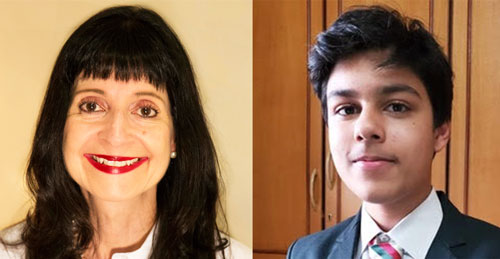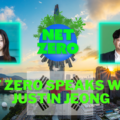这个月, 观众可以放映 净零对话王凯伦 在星球课堂网络上. This film is curated for the Planet Classroom Network by the Protect Our Planet Movement and Planet Classroom.
Karen Wang, CEO of Climind, believes that technology and innovation can be harnessed to combat climate change. Her company uses artificial intelligence and machine learning to assist corporations and governments in reducing their carbon footprint. Vedaant Thuse 巴尔, a student and climate activist at Indus International School, is studying the human contribution to climate change as part of a Carbon Footprint Reduction initiative. 最近, Vedaant interviewed Wang for the Net Zero series to understand how Climind helps researchers and businesses use climate data to make informed decisions and lower emissions in the fight against climate change.
全球搜索教育 很高兴欢迎 Vedaant Thuse 巴尔.
Vedaant, why did you select Hanyuan Wang to interview? What inspired you about Climind?
In a corporate world threatened by global climate change, growth and sustainability are rarely able to cooperate. Hanyuan Wang is one of the few that is able to make them function together. Perhaps her work that best displays this is that done in voluntary carbon markets. As companies attempt to meet a changing status quo of net zero carbon emissions, many pay other private bodies that are removing emissions from the environment in order to cancel their own emissions. This incentivizes the reduction of emissions and the increase of absorption of greenhouse gases from the atmosphere. It also results in a higher level of circulation of capital within national economies, creating more productive societies globally. Hanyuan Wang’s ability to make systems function and thrive while satisfying all parties involved is an example to follow in the space of climate change, if we are to aim for long-term sustainability with growth.
面试中最让你惊讶的是什么?
Companies can be persuaded to pursue goals in line with environmental ethicality. Climate reform has largely taken place in the form of regulatory action, which is primarily effective when the issue affects the momentary interests of a nation. 然而, laws are arguably less strictly made and enforced when it affects the future interests of the entire world. There is one kind of reform, 然而,, which will always motivate any company, and that is a social kind of power. In an information era, consumers have the ability to evaluate their purchasing choices and the effects of the same on the environment; on a large scale this results in large shifts of capital flows in economies. Through this power, consumers have either the power to incentivize climate reform, or risk being apathetic and eventually helpless to their own fate. Those that have the most power in shifting the tectonic plates of society, 然后, seem to just be ordinary Joes.
有哪些 3 main takeaways for the Net Zero audience from your interview with Karen?
第一, emissions can be limited or prevented through government and social actions. 二, the current government and social bodies that exist are a powerful tool for management of policy. 最后,, it is more effective to reward positive actions than punish the negative ones: rewards create goals to meet, and punishments create lines to be crossed.
Thank you Vedaant!
C.M. Rubin and Vedaant Thuse Bal
不要错过 净零对话王凯伦, 现已在星球课堂网络上直播. This film is curated for the Planet Classroom Network by the Protect Our Planet Movement and Planet Classroom.







最新评论